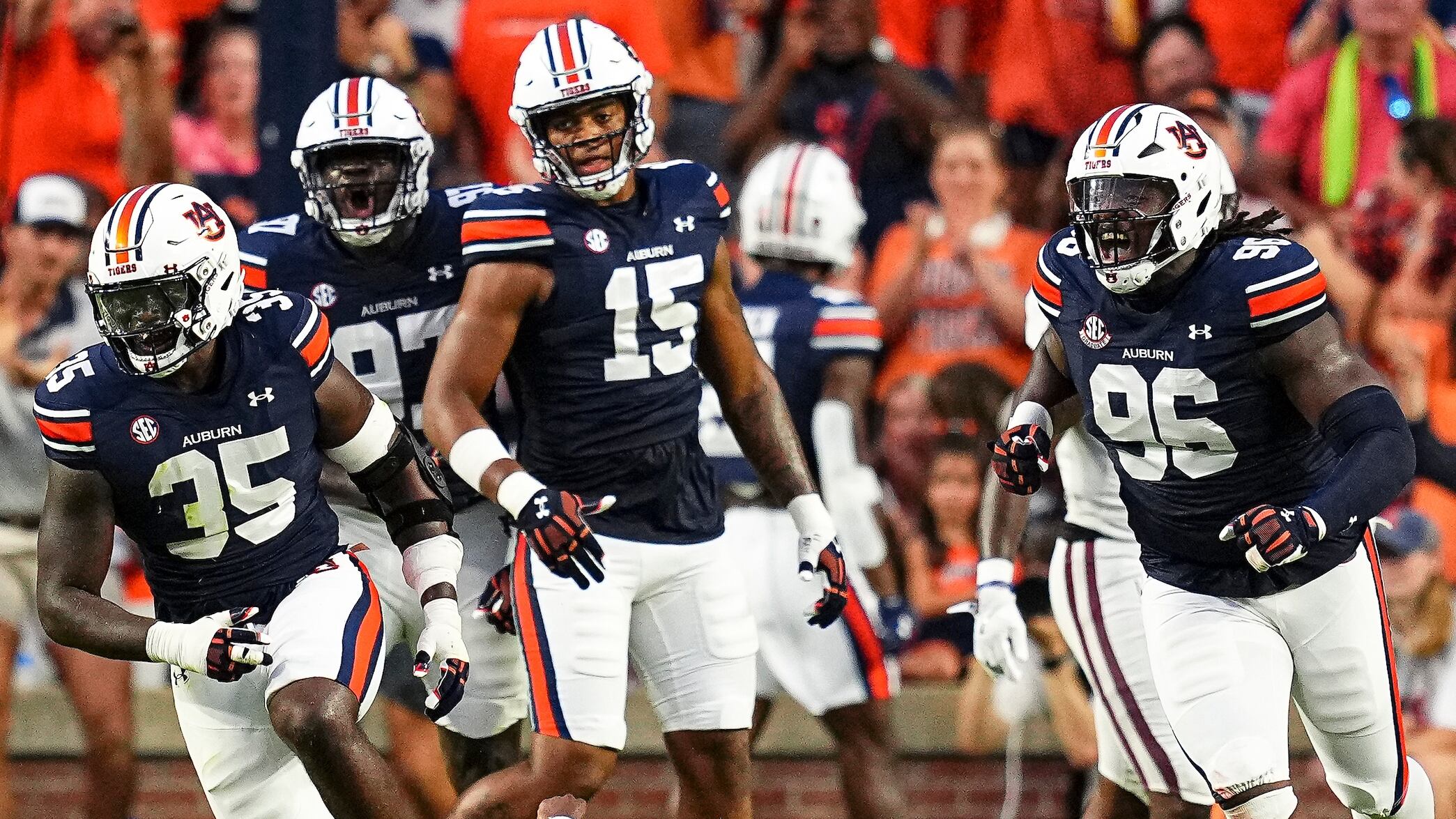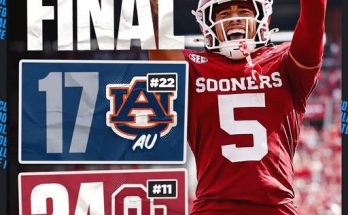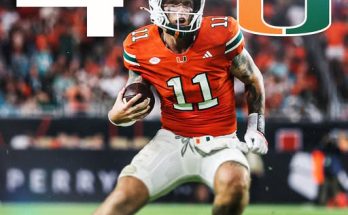:
There’s something different about Jordan-Hare Stadium when the sun goes down. The orange lights seem to burn brighter, the chants get louder, and the ghosts of the past seem to wake up from their slumber to watch the Tigers play. And on this particular night, when all odds seemed stacked against them, Auburn summoned every ounce of that prime-time magic to pull off a game that won’t soon be forgotten.
Coming into the matchup, Auburn wasn’t supposed to win. Not on paper, not in theory, and certainly not against a Georgia team that had dominated the SEC for the better part of a decade. The Bulldogs were the reigning powerhouse, still carrying the swagger of back-to-back national championships, loaded with five-star recruits and experience in all the right places. Auburn, on the other hand, was in the early stages of a rebuild under Hugh Freeze, still searching for offensive identity, still figuring out how to finish games, and still trying to quiet a fanbase desperate for relevance.
But college football is built on moments that ignore logic. It’s a sport that thrives on emotion, thrives on noise, and thrives on the kind of belief that exists more in the hearts of fans and players than in any analytical model. On this Saturday night, as the sky darkened over the Plains and the stadium roared to life, Auburn decided it wasn’t going to be another chapter in Georgia’s story. It was going to be the night they wrote their own.
It started with attitude. From the first defensive series, it was clear Auburn wasn’t going to be pushed around. The Tigers were physical, flying to the ball, playing like every snap was personal. Georgia’s offense, usually so smooth and mechanical, looked uncomfortable. Quarterback Carson Beck was harassed all night, pressured by blitzes and a relentless defensive front that refused to let the pocket stay clean. Auburn’s linebackers played sideline to sideline, forcing Georgia to fight for every yard.
Then came the offense—the biggest question mark for Auburn all season. Up to this point, it had been inconsistent, marked by flashes of potential and long droughts of inefficiency. But Hugh Freeze, often criticized for conservative game plans, reached deep into his playbook and unleashed a mix of tempo, motion, and unpredictability that finally unlocked something. Quarterback Payton Thorne played his best game of the year, making smart decisions and keeping the defense honest with his legs. Robby Ashford added the kind of spark that only he can, with red zone packages that turned stalled drives into points.
But it wasn’t just play-calling or execution—it was belief. Every time Georgia made a push, Auburn responded. A crucial third-down stop in the second quarter ignited the student section. A fourth-down conversion late in the third sent a surge of electricity through the sideline. The team wasn’t playing scared anymore. They were playing to win. And they were playing for each other.
Then came the moment. Every great game has one—that single, unforgettable sequence where everything changes. For Auburn, it came late in the fourth quarter, with the game tied and the stadium at full tilt. Georgia had the ball, threatening to drive and snatch victory like they had so many times before. But on a crucial third down, Auburn’s defense rose up. Defensive end Jayson Jones blew through the line and hit Beck as he released the ball. The pass fluttered in the air, and linebacker Eugene Asante came down with it. Picked off. Jordan-Hare exploded.
That turnover gave Auburn a short field, and the offense capitalized. A few plays later, Jarquez Hunter plowed into the end zone from five yards out, giving Auburn the lead and sending the fans into hysteria. But there was still time. Georgia wasn’t going to go quietly. Beck marched the Bulldogs down the field, converting two clutch third downs and moving into the red zone with under a minute left.
That’s when the nightmare loomed. Auburn fans had seen this movie before—so many games lost in the final seconds, so many near upsets that slipped through their fingers. But not tonight. Not under these lights. On second and goal from the eight-yard line, Beck looked for Brock Bowers—Georgia’s unstoppable tight end. But Auburn had bracketed him, forcing Beck to look elsewhere. He tried to hit his slot receiver over the middle, but safety Donovan Kaufman jumped the route and batted it down. On third down, the pressure forced a throwaway. And on fourth, with everything on the line, the coverage held and the pass fell incomplete.
The roar was deafening. The field flooded. Players, students, fans—everyone who had worn heartbreak on their sleeves for so long—rushed to celebrate a win that meant more than just a number in the standings. It was about pride. It was about proving that Auburn still belonged.
For Hugh Freeze, the win was vindication. He had inherited a broken roster, a fractured program, and a fanbase exhausted by mediocrity. He had asked for time, for patience, and for belief. And on this night, under the lights of Jordan-Hare, he gave them something real to believe in.
The post-game scene was emotional. Players embraced on the field, tears mixing with sweat. Seniors who had endured coaching changes and losing seasons finally had their signature win. Younger players saw what it meant to wear the Auburn jersey with pride. And for the fans—the ones who packed the stands long before kickoff, who screamed until their voices were gone—it was a moment they’ll tell their children about one day.
There’s a reason they call it “Auburn after dark.” It’s not just about the time on the clock—it’s about the atmosphere, the tradition, and the unexplainable energy that seems to hang in the air like magic. It’s about games like this, where the improbable becomes reality and the underdog bites back. Georgia came in with every advantage, but they left with their first real scar in years.
Of course, one win doesn’t erase the challenges Auburn still faces. The offense still needs to find consistency, the recruiting battles still rage, and the SEC West remains a brutal gauntlet. But none of that mattered in the aftermath of this win. For one night, the scoreboard told a story of resilience, fight, and belief. And in college football, that’s more than enough.
Fans spilled into Toomer’s Corner, rolling the trees with toilet paper like they had just won a championship. In a way, they had. Maybe not on a national scale, but in the hearts of everyone who loves Auburn football, this was as good as it gets. A win over the mighty Georgia Bulldogs. A night game. A packed house. A perfect storm.
It’s not often you get to watch a team transform in front of your eyes. But that’s what happened here. Auburn didn’t just beat Georgia—they became something new. They became a team that refuses to be overlooked. They became a team that fights. A team that believes. And maybe, just maybe, a team that’s ready to rise again.
There will be more battles ahead. SEC Saturdays don’t get easier. But now, Auburn has proof—proof that the culture is changing, that the talent is developing, and that the future is worth waiting for. And sometimes, one night is all it takes to change the trajectory of a program.
Auburn got Georgia after dark. And in doing so, they turned what could’ve been another nightmare into a night that will live forever on the Plains.



